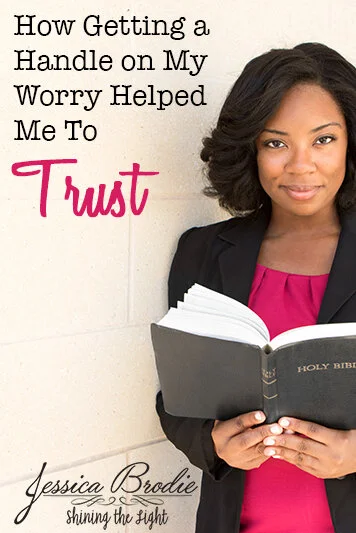How getting a handle on my worry helped me to trust
By Jessica Brodie
It took getting called out for me to realize I had trust issues.
I’d been at a church event, and I needed to step away from my table a quick minute during a break. Instead of leaving my stuff where it was, like everyone else did, I brought it with me.
“Afraid someone was going to steal your notebook?” a friend teased when I returned.
I started to laugh—except, well. She was right. A part of me was scared someone would steal my notebook.
At church. Surrounded by friends. Yikes.
That day, I thought about her words and realized there was a pattern. I almost never trusted things would be fine without my watchful eye. Having grown up in South Florida highly aware of the possibility of crime, I compulsively locked my doors and still stuck to “proper purse walk” as I’d been trained—tucked under my arm, tight against my body, not slung haphazardly over my shoulder where I’d be a good target for any purse snatcher. I walked to my car in any parking lot with my keys threaded through my fingers, just in case a would-be rapist or carjacker thought I was easy prey and I needed to counterattack with a jab to the eye. And yet I’d lived in small, relatively safe communities in the Carolinas for nearly two decades, where I knew not everybody was raised to think the world could just take their stuff at any given moment.
I’m convinced bad things can happen anywhere, even so-called safe communities, so I stand by my conviction that we should all be conscious about personal safety. I keep an eye on my surroundings, and I do lock my doors.
But my issue went deeper than mere security awareness or force of habit. It was a genuine concern someone would break in or steal from me—fully rooted in worry.
What was I so worried about? I wondered. Stuff is just stuff. And wasn’t I supposed to have a generous heart, anyway? If someone needed my notebook badly enough to take it, I’m sure they needed it far more than I did.
As a Christian, I was concerned my lack of trust deep down meant lack of faith. But trust and faith are two different things. Faith is a noun, a state of being. It’s convicted belief, such as my deep and abiding soul-understanding that God is everywhere and created the world. Trust, however, is a verb—a choice, an action. As a woman of faith, I wanted to put that faith into action. Yet I was a perpetual worrier.
But the Bible has some strong words about worry. Jesus said in the Gospel of Matthew:
“Therefore I tell you, do not worry about your life, what you will eat or drink; or about your body, what you will wear. Is not life more than food, and the body more than clothes? Look at the birds of the air; they do not sow or reap or store away in barns, and yet your heavenly Father feeds them. Are you not much more valuable than they? Can any one of you by worrying add a single hour to your life?” (Matthew 6:25-27 NIV).
Why worry? I asked myself that day. Will it help? Will it change anything? Sure, I need to be responsible for my own safety, but even if I am perfectly, fully safety conscious, who is in control of my life: me or God? Of course, it’s God.
The game changer for me was owning what Jesus said, above. God has me in His hands. He takes care of me. If something bad were to happen to my body or my home or the people I love, I know we’d be OK in the end, for we have an eternal home with God that goes on past this life and any temporary suffering we might experience here.
Trust is still an issue for me, but I’m getting better each day. It’s a choice to walk in faith, and that is what I choose.

